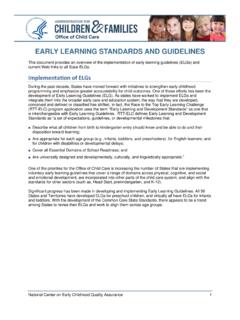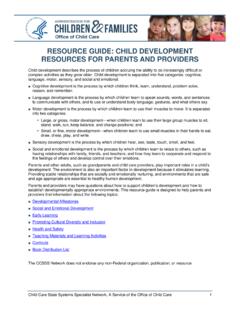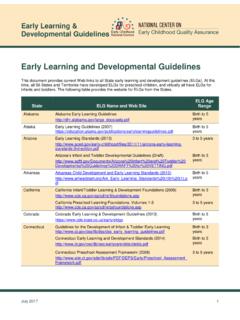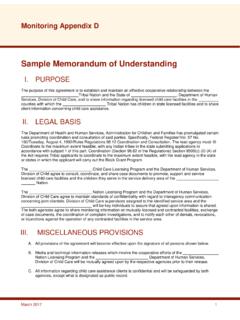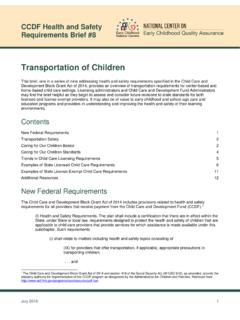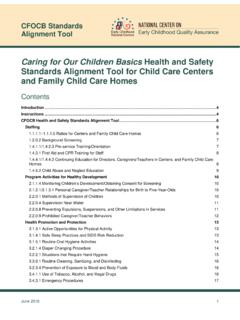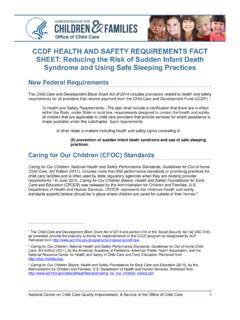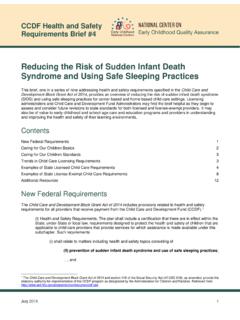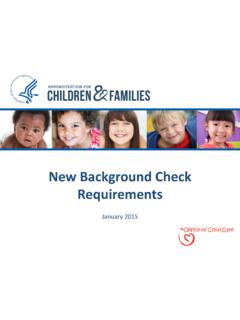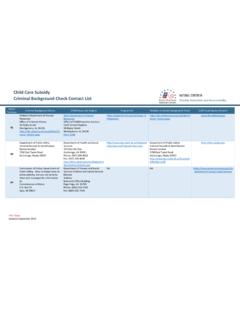Transcription of Reflective Supervision: A Systems Approach
1 State Capacity Building CenterHolly Wilcher, Infant/Toddler Specialist, Region IVReflective supervision : A Systems Approach1 State Capacity Building CenterFacilitators Kelley Perkins, State Capacity Building Center Infant/Toddler Technical Assistance Specialist, Region III Holly Wilcher, State Capacity Building Center Infant/Toddler Technical Assistance Specialist Region IVState Capacity Building Center2 State Capacity Building Center3 Agenda Welcome, introductions, and learning outcomes Reflective practice Reflective supervision State approaches to Reflective supervision capacity building Questions and answers ThankyouProfessional Learning Goals Participants will be able to.
2 Define Reflective practice and Reflective supervision ; identify the importance and purpose of Reflective practice and Reflective supervision ; and describe strategies to support Reflective supervision at a program and state Capacity Building Center4 Select the Role That Fits You Best Community member Direct child-serving practitioner ( , child care, preschool, home visiting, teacher) Family member State government professional State-level professional (not state government) Training and technical assistance professional Other (please describe)State Capacity Building Center5 What Is Your Personal Knowledge or Experience with Reflective supervision ?
3 I could fit my knowledge and experience about Reflective supervision on a: stamp; postcard; letter; or Capacity Building Center6 What Does Reflective supervision Look Like in Your State or Territory?Currently in my state or territory .. There may be some programs and initiatives that include a Reflective supervision component, however I m not aware of them. There s at least one early childhood program and/or initiative that includes Reflective supervision as a component. We re actively working toward developing capacity for Reflective supervision within and across early childhood environments and direct and indirect service providers.
4 We have a formal Approach to delivering Reflective supervision across early childhood sectors and settings for direct and indirect service providers. I m Capacity Building Center7 Reflective PracticeState Capacity Building Center8 What Does the Research Say?Reflecting on practice enables practitioners to discover, rediscover, or understand the complex range of knowledge, skills, and understanding they have and to develop and use the intellectual and emotional power within themselves to try and improve their situation (Fullan, 2003)State Capacity Building Center9 Reflective Practice Discover Understand Use intellectual and emotional power within ImproveWhat Is Reflective Practice?
5 Thinking about and analyzing our actions in order to improve our professional practice. Exploring and explaining events, not just describing them. Analyzing our anxieties, errors, and weaknesses, as well as our strengths and Capacity Building Center10 What Do Reflective Practitioners Do? The Reflective practitioner allows him or herself to: experience surprise, puzzlement, or confusion in a situation he or she finds uncertain or unique; reflect on presented phenomenon and on the prior understandings that have been implicit in his or her behavior; and carry out experiments that serve to generate both a new understanding of a phenomenon and a change in the situation.
6 (Scho n,1983)State Capacity Building Center11 Bridging Theory to PracticeReflective practice is active, dynamic action-based and ethical set of skills, placed in real time and dealing with real, complex and difficult situations. (Moon, 2013)State Capacity Building Center12 GibbsState Capacity Building Center13 Gibbs, G. (1988).How have you integrated Reflective practice in your work or in infant/toddler initiatives?State Capacity Building Center14 How Has Your Knowledge of Reflective Practice Improved? Not improved A little improved Moderately improved Significantly improvedState Capacity Building Center15 Reflective SupervisionState Capacity Building Center16 What Is Reflective supervision ?
7 Reflective supervision is a relationship for learning. (Fenichel 1992; Shahmoon-Shanok 2009)The process of examining, with someone else, the thoughts, feelings, actions, and reactions evoked in the course of working closely with young children and their families. (Eggbeer, Mann, & Seibel 2007)State Capacity Building Center17 Reflective supervision and Consultation:A Relational ProcessA process that is uniquely individualA partnership requiring mutual regard, commitment, and presence A relationship in which you search for meaning A relationship in which worries can be shared A place in which one discovers his/her competence/confidence, not alone, but within a relational context A time to pause and share the thoughts, feelings, and responses that you have about another (the infant, toddler, parent, supervisee, etc.)
8 State Capacity Building Center18 Relationships State Capacity Building Center19 Reflective SupervisionRelationshipsRelationshipsRel ationshipsProcess A supervisor and supervisee work together, set goals together, enter into a partnership, ask questions, and discuss strengths, risks, and A shared learning experience, each remaining fully present and emotionally open to the other, and each contributing to the A time and place for gentle questioning to wonder together about the child, the family, the story, and one s own emotional response to what is seen and heard in effort to guide the work and take the next Dual ProcessState Capacity Building Center20(Parklakian, 2001)Parallel Process Parallel process means the way in which the supervisor interacts with the supervisee models for the supervisee what he or she should do with his or her clients ( shulman , 2008).
9 Do unto others as you would have others do unto others (Pawl & St. John 1998, )State Capacity Building Center21 The way supervisors relate to staffThe way staff relate to parentsThe way parents relate to childrenSupportsSupportsReflective supervision and Consultation The shared exploration of the emotionalcontent of infant and family work as expressed in relationships between parents and infants, parents and practitioners, and supervisors and practitioners. (Weatherston & Barron, 2009, ) State Capacity Building Center22 Three Building Blocks of Reflective Capacity Building Center23(Parklakian, 2001)How Has Your Understanding of Reflective supervision Improved?
10 Not improved A little improved Moderately improved Significantly improvedState Capacity Building Center24 State Examples of Reflective supervision Capacity Building EffortsState Capacity Building Center25 ColoradoMichiganMinnesotaVirginiaWiscons inconsin Reflective supervision to Support the Infant/Toddler Workforce: State ExamplesColorado Consortium of Reflective supervision volunteers Specialized training track at the annual conference Infant/Toddler Expanding Quality Infant Toddler Relate Model includes Reflective supervision (visit for more informationMichigan Annual professional learning symposiums (visit )Minnesota Consultants receive Reflective practice training (visit ) Annual symposium Reflective supervision online course (visit )Virginia Training course for home visitors (visit ) Wisconsin Reflective supervision Definition adoption -Demystifying Reflective Practice.)
